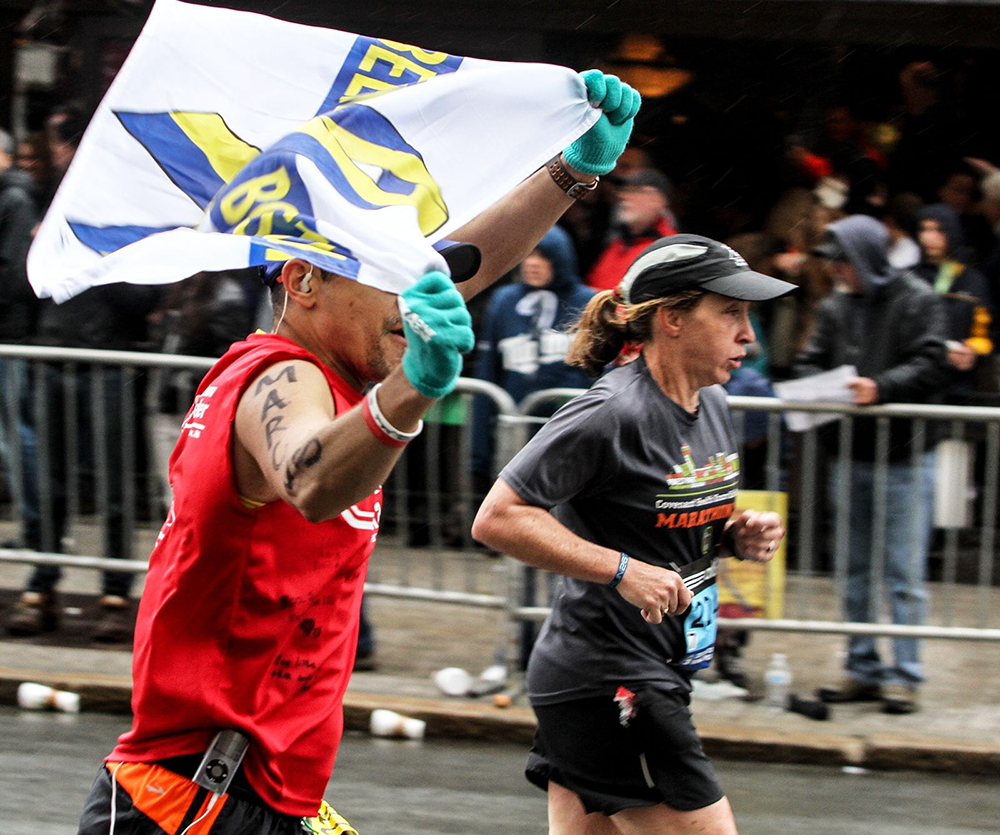
In light of the fifth anniversary of the Boston Marathon bombings, the City is planning a memorial in honor of bombing survivors and first responders.
Currently, the Mayor’s Office of Arts and Culture and the Boston Art Commission is seeking proposals from consultants to lead discussions with Boston residents and families impacted by the bombings. These conversations will inform the selection of an artist to design the memorial.
The City plans to conduct town hall-style meetings, multimedia campaigns and hands-on activities to engage the community and promote inclusive dialogue, according to a press release from Mayor Martin Walsh’s office.
“When commissioning a piece of public art that reflects such a far-reaching tragedy as the Boston Marathon Bombings, it is essential to develop a community engagement process that allows the voice of every Boston resident to be heard,” Julie Burros, Boston’s chief of arts and culture, said in the release.
The memorial honoring survivors and first responders will offer a place for healing, according to Max Grinnell, a public art expert and lecturer at the Massachusetts College of Art and Design.
“Art really is therapy for folks,” Grinnell said. “I think giving people a physical place to come together as needed or on a yearly basis to commemorate those events … is the importance and function of a memorial.”
In the press release, Walsh said that his vision for the memorial will underscore the resiliency of the city.
“This memorial will serve as a testament to the spirit and resiliency of the people of Boston and a way to honor those we have lost and those who are still healing,” Walsh said.
Roseann Sdoia, a survivor of the 2013 attack, said memorializing the spirit of “Boston Strong,” a phrase that was popularized after the bombings, in the piece will remind residents to continue to push through adversity together.
“I personally feel … as much as sometimes you might have felt heavy pressure to be ‘Boston Strong,’ I also do believe that it gave us [those who were injured] incentive to push for a full recovery and to keep moving and to give back and be there for others who may need it as well,” Sdoia said.
A Roxbury resident, Lauren Kostich, said for her, “Boston Strong” epitomizes the city’s identity.
“There have been several instances in history where Boston has been torn apart by neighborhood … so I think focusing on Boston’s resilience and ability to come together in order to get through hard times … is what ‘Boston Strong’ means,” Kostich, 26, said.
However, others are not convinced the idea of “Boston Strong” is an appropriate way to memorialize survivors and first responders.
Connor Buckley, a Jamaica Plain resident, said capturing the resiliency of survivors and first responders is important, but the memorial shouldn’t be directly associated with a slogan.
“I thought it was a weird thing to sloganize the tragedy immediately after,” the 26-year-old said. “It felt like a commoditization of the whole tragedy, and it turned out that way too, [with] people immediately selling bumper stickers and T-shirts and everything.”
Mélida Arredondo and her husband Carlos are both survivors of the bombing. Carlos even helped several injured people in the moments after the bombing. But Arredondo said she thinks the phrase “Boston Strong” tends to exclude communities of color.
“To bring the whole city together around [the memorial], I’m hoping images of people are multicultural … because the Marathon itself is multicultural,” Arredondo said.
The focus of the memorial should be acknowledging the visible and invisible wounds survivors and first responders continue to endure, regardless of background, Arredondo said.
“I would like to see them [the City] acknowledge all those with the hidden wounds … as well as those with the ongoing physical signs that they were left disabled from the attack,” she said.
Shelly Bramson, 77, of South Boston, said a statue or sculpture with the engraved names of survivors and first respondents located in a central location in the city, such as Copley Square, would be one way for the city to highlight the importance of the Boston Marathon bombings to the city’s identity.
“Copley Square would be a perfect area for it because it would have the most exposure to tourists because everybody ends up going to Copley Square when they’re coming to Boston,” Bramson said.






















































































































